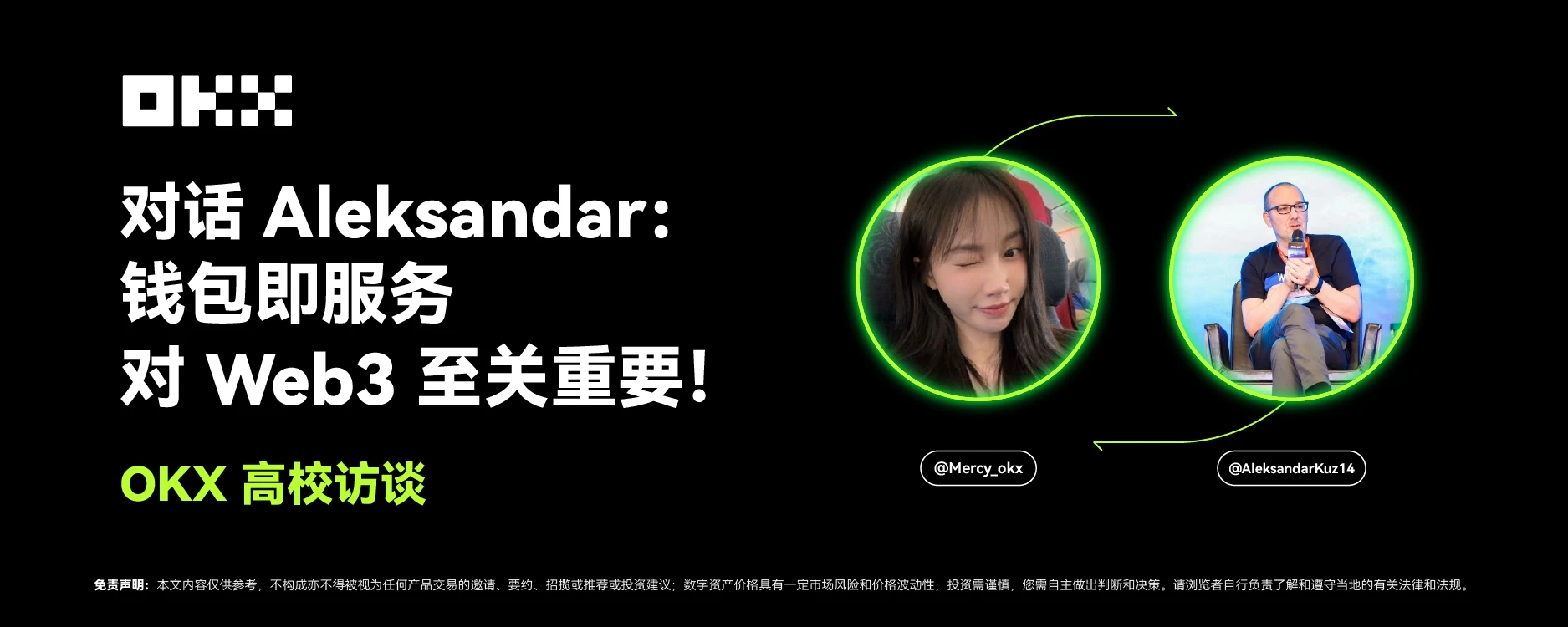
Aleksandar Kuzmanovic is a professor of computer science at Northwestern University in the United States. He has been focusing on computer network research. The Northwestern Networks group he leads is committed to building protocols and systems that can increase the speed of Internet operations. He founded the bloXroute lab in 2017, hoping to promote network scalability by improving blockchain efficiency. Today, bloXroute has become a recognized network layer solution for multiple blockchains and is widely used by traders in the DeFi field.
Through interviews, we hope to understand how entrepreneurs with university backgrounds around the world see the future development of the Web3 industry, and how they integrate their expertise with blockchain technology? Therefore, we specially invited Professor Aleksandar Kuzmanovic to be the guest speaker of the OKX University Interview series. In his sharing, he said: Wallet as Service is crucial in promoting the large-scale adoption of blockchain. This is the key for Web3 to welcome the next 1 billion users. I hope his background and experience can provide us with a unique perspective on the industry. The following is the original interview text, I hope it will be helpful to you.
The OKX University Interview series is a special column produced by OKX and hosted by OKX official community ambassador Mercy (@Mercy_okx). It aims to explore the industry perspectives of people from universities around the world and provide reference for friends who are starting businesses in Web3 and looking for jobs.
1. Please briefly introduce yourself
I am Aleksandar Kuzmanovic, a professor of computer science at Northwestern University, focusing on computer network research. I lead the Northwestern Networks group, which is dedicated to building protocols and systems that can make the Internet run faster. When I first came into contact with blockchain, I naturally viewed it as a computer network optimization problem, because blockchain is essentially a network that relies on efficient data transmission. This realization prompted me to found bloXroute Labs in 2017 to focus on solving this challenge. Initially, our vision was to promote the expansion of blockchain by making it more efficient. Today, bloXroute has become a recognized network layer solution for multiple blockchains and is widely used by traders in the DeFi field.
2. In your opinion, what is the current status of the Web3 industry?
Web3 has been developing rapidly in recent years, and now we can easily look back at the changes in the past decade. For example, when we founded bloXroute Labs in 2017, DeFi and MEV did not exist at all. This shows that innovation in this field is advancing at an astonishing speed. This is not surprising, because when building a new financial system, especially a system based on a new concept, there are always a lot of problems that need to be solved.
In my opinion, one thing is very clear: in the first few years, Web3 was mainly driven by peoples vision of the potential of blockchain, and new blockchain projects emerged almost every day. Although there is still a lot of room for innovation in the field, I think the industry has entered a relatively stable stage now. Next, the real challenge is how to make blockchain easier for ordinary users to use.
3. What do you think is the core driving force for the future development of the Web3 industry? How do you view the current talent situation in the Web3 industry?
I think this is definitely the multi-billion dollar question, especially about how to achieve mass adoption. As I mentioned before, there has been significant progress in blockchain performance. At the same time, I have recently observed that people are investing more effort in how to make this technology accessible and usable by ordinary users. In my opinion, the development of Wallet as a Service (WAAS) is crucial, which effectively shortens the distance between blockchain technology and ordinary users. Now, users can use blockchain technology more and more conveniently without having to delve into technical details that they neither care about nor need to understand, and may not even know that they are using blockchain. In my opinion, these are very positive developments.
Of course, I hope that universities can play a role in this. Given that the Web3 space is full of technical challenges, at the intersection of cryptography, computer science, game theory, and finance, it is important to have sound and rigorous methods (including peer-reviewed publications) to systematically help solve these problems.
Over the past decade, attitudes at Northwestern University and in academia as a whole have changed significantly. Northwestern University itself is unique because we have the top Kellog School of Management, which provides great potential and talent for entrepreneurship, many of whom have entered the Web3 field.
A similar trend is occurring in the School of Engineering. Blockchain courses in particular are regularly taught by professors from a variety of fields, covering subjects ranging from game theory to computer systems. This is exposing more and more students to and engaging with Web3. It is exciting to see how much Web3 has become a mainstream topic.
4. In the next 5-10 years, what areas of the Web3 industry are most likely to undergo major changes?
In addition to bloXroute, my friend and colleague Professor Xinyu Xing (who recently joined us from Penn State) is also the founder of Sec 3, a company focused on smart contract auditing. Smart contract auditing is obviously a critical area for a simple reason - even minor mistakes can lead to catastrophic consequences, as we have witnessed many times in the past. Therefore, it is essential to ensure that the implementation and deployment of smart contracts are rigorously verified.
I have two pieces of advice for entrepreneurs interested in entering the Web3 space. The first is more general - if you believe in your idea or project, go for it, show it, and fight for it. The second is that it is never too late to have a good idea, especially in a relatively young field like Web3. I remember facing similar challenges when I founded bloXroute Labs with my PhD student Uri Klarman in 2017. At the time, it felt like the industry had stabilized, as if there wasnt much room for new projects. But it turns out that wasnt the case in 2017, and its not the case now. Theres always room for new ideas to develop.
5. After years of working in the Web3 industry, do you have any insights to share?
My academic and entrepreneurial journey in the Web3 space is quite unique. At first, like many people, I had heard of Bitcoin, but I didnt pay much attention to it and never thought it would have such a big impact. Many peer-to-peer systems have been developed over the years, and I thought Bitcoin was just one of them. The difference is that Bitcoin has the potential to be truly transformative because its goals go far beyond the scope of ordinary systems.
A few years after Bitcoin became popular, other blockchain technologies began to attract attention. So my students and I began to study blockchain and explore other applications. We published several academic papers in this field, and it was through these studies that we accumulated a deep understanding and practical experience of blockchain systems.
These experiences eventually led to the birth of bloXroute Labs. We realized that just like there are private networks for content distribution or traditional financial services, blockchain also urgently needs an efficient private network. The biggest challenge is how to design an efficient network while retaining the core decentralization characteristics of blockchain.
Finally, and most importantly, ideas have to be put into action to be meaningful. Having an idea is just the beginning, it is just an idea. What really drives us to success is a group of dedicated and passionate people, like Uri Klarman and Eyal Markovich of bloXroute. They are because of these talents that they were created, seen and used by people. Therefore, people with execution ability are the real key to success.
Risk Warning and Disclaimer
This article is for reference only. This article only represents the authors views and does not represent the position of OKX. This article is not intended to provide (i) investment advice or investment recommendations; (ii) an offer or solicitation to buy, sell or hold digital assets; (iii) financial, accounting, legal or tax advice. We do not guarantee the accuracy, completeness or usefulness of such information. Holding digital assets (including stablecoins and NFTs) involves high risks and may fluctuate significantly. You should carefully consider whether trading or holding digital assets is suitable for you based on your financial situation. Please consult your legal/tax/investment professionals for your specific situation. Please be responsible for understanding and complying with local applicable laws and regulations.










